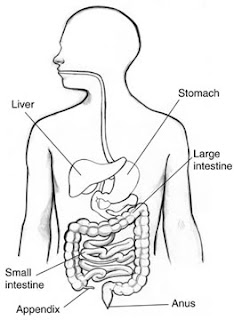Indigestion, also called dyspepsia, is the term used to describe one or more symptoms including burning or pain in the area of the upper abdomen, feeling of fullness during a meal, and uncomfortable fullness after a meal. In some people, the condition can occur once in a while. While in others, indigestion may occur as often as every day.
There are many indigestion causes including gastroesophageal reflux disease (GERD), peptic ulcers, cancer, or abnormality of the pancreas or bile ducts. If the condition improves or resolves, indigestion symptoms usually improve.
Sometimes, the cause of indigestion cannot be found. This indigestion type is called functional dyspepsia, which is thought to occur in the area where the stomach meets with the small intestine. The indigestion may be related to abnormal motility—the squeezing or relaxing action—of the stomach muscle as it receives, digests, and moves food into the small intestine.
Indigestion Symptoms
People with dyspepsia or indigestion usually have more than one of the following symptoms:
Fullness during a meal. The person feels overly full soon after the meal starts and cannot finish the meal.Some rare symptoms of the condition include nausea and bloating—the sensation of unpleasant tightness in the stomach. However, nausea and bloating may be caused by digestive problems other than indigestion.
Bothersome fullness after a meal. The person feels overly full after a meal—it may feel like the food is staying in the stomach too long.
Epigastric pain. The epigastric area is between the lower end of the chest bone and the navel. The person may experience epigastric pain ranging from mild to severe.
Epigastric burning. The person feels an unpleasant sensation of heat in the epigastric area.
Indigestion Treatment
In some people, making some lifestyle changes and decreasing stress may help relieve the symptoms of indigestion. Lifestyle changes may include eating several small; low fat meals throughout the day at a slow pace; quitting smoking; avoiding coffee, carbonated drinks, and alcohol; and stopping medications that may irritate the lining of the stomach, such as aspirin or anti-inflammatory drugs.
Your doctor may recommend over-the-counter antacids or medications, which help reduce acid production in the stomach. Medicines that help the stomach move food more quickly into the small intestine may also help.
Some medications that your doctor might prescribe may include antacids, H2 receptor antagonists (H2RAs), proton pump inhibitors (PPIs), prokinetics, or antibiotics to treat the symptoms of indigestion.
Suggested Readings:
View List of Digestive Diseases Topics.
Source:
Indigestion (November 2008). NIH Publication No. 09–4549. National Digestive Diseases Information Clearinghouse. Accessed: November 25, 2009
Page Last Revised: December 4, 2010
[Top of Page]

 The bacteria in the appendix can multiply and cause inflammation of the appendix. Symptoms of disease include pain in the lower right part of the abdomen, low-grade fever, nausea and vomiting.
The bacteria in the appendix can multiply and cause inflammation of the appendix. Symptoms of disease include pain in the lower right part of the abdomen, low-grade fever, nausea and vomiting.